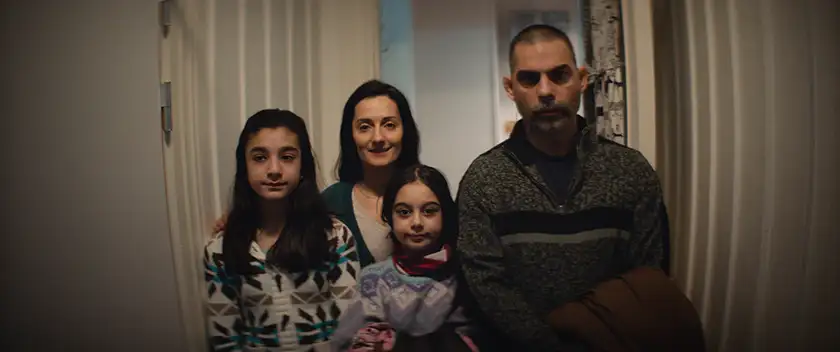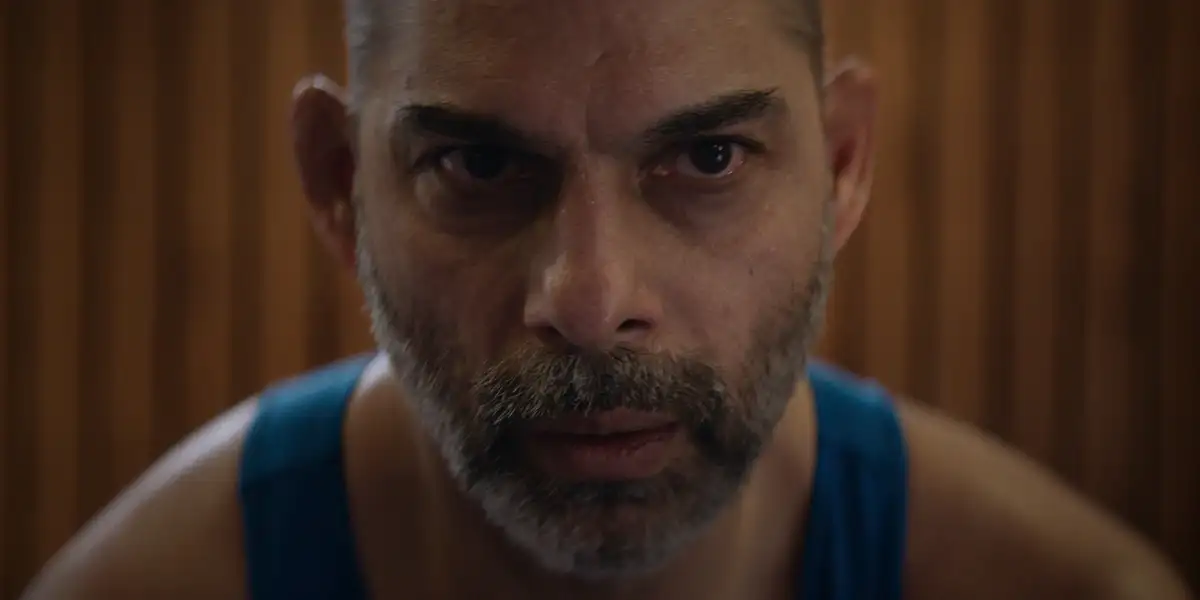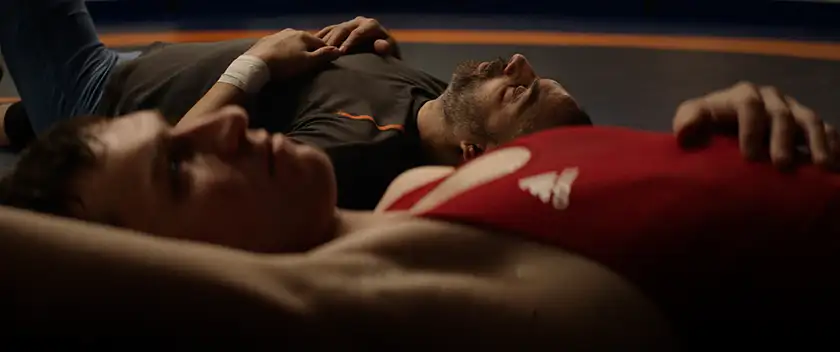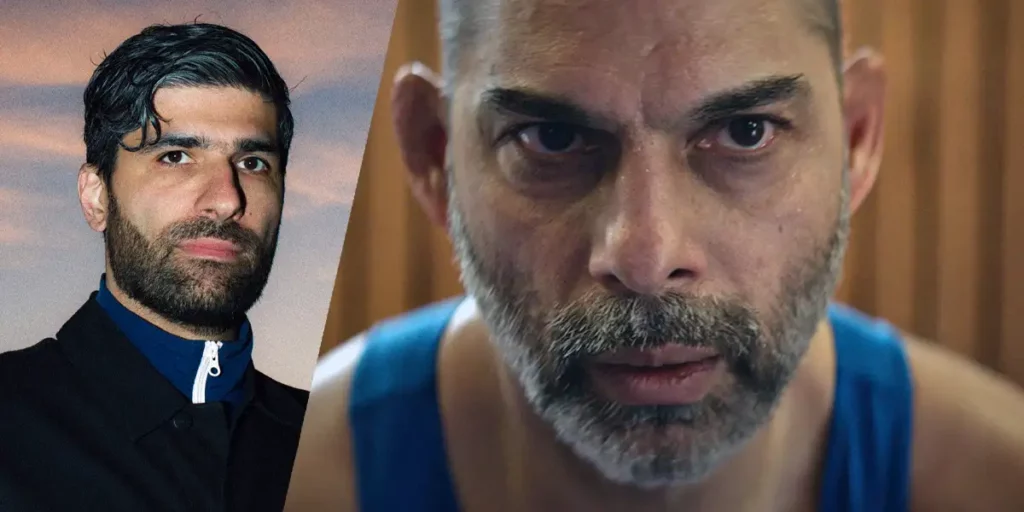We sat down with the director of Opponent, Milad Alami, for an interview to discuss his new film and refugee cinema.
After premiering at the 73rd Berlin Film Festival earlier this year, Opponent is coming to UK cinemas on 12 April. The film is directed and written by Iranian-born director Milad Alami who, much like the characters in his film, also went to Sweden as a refugee with his family when he was young.
Milad Alami’s Opponent follows an Iranian refugee, Iman (Payman Maadi), who has moved to Northern Sweden after fleeing Iran and is awaiting asylum in a refugee centre, along with his wife Maryan (Marall Nasiri) and daughters. To strengthen and speed up their asylum application, a translator suggests that Iman could resume playing wrestling as he was an Olympic wrestler in Iran. The film explores Iman’s training and the difficulties that this causes both within his family and with his former teammates, as well as the challenges of refugee life in Sweden.
We sat down with the director Milad Alami to talk about his film, authentic filmmaking, and refugee cinema. Read our full interview!
Milad Alami on how he started working on Opponent and what inspired the film
What inspired you to make Opponent in the first place?
Milad Alami: I was inspired by two things. Firstly, I was a refugee myself in the north of Sweden. I was six years old when I moved there from Iran and I always wanted to do something with those memories and that experience. The film grew out of that – the feeling of being in this refugee centre, in the snow, while waiting for life to begin. I also wanted to do something about sexuality, censorship, and self-censorship under the Iranian regime. The story came from there: I did the film about this wrestler who had to leave Iran because of his sexuality. I also wanted to explore how that affected his family when he came to the refugee centre, where he wasn’t the person he was in Iran. These questions were interesting to me.
The protagonist has something in common with you. Are there any biographical elements in the story or the protagonist?
M.A.: Not in terms of his journey per se, but more in the sense of the experiences of being a refugee. I remember very vividly being in the refugee centre, sitting in these rooms with the snow outside, and moving around all the time between these rooms that all looked the same. It was this mix of being very much happy for this new place and the new life, but also the anxiety about everything else. Those feelings are in Opponent, but there is nothing autobiographical about the character at all: that is fiction.
Is there a visual influence that inspired you? Or anyone in Swedish cinema that you were looking up to when you made Opponent?
M.A.: Not really. When I make films, I don’t usually look for examples. I do look at photos or write memories. For Opponent, I talked to my cinematographer, Sebastian Winterø, and tried to figure out which feelings I wanted to portray. But I did not have any specific references, to be honest. It was mostly talking about my own memories, the feeling of coldness, and this feeling of waiting all the time.

Milad Alami on portraying refugees in an authentic way in Opponent
Opponent feels very authentic, especially the scenes in the refugee camp. Were you looking to achieve this authenticity? Did you do a lot of research on this?
Milad Alami: Yes. All of the extras in the film are real refugees, so we used that. They were real refugees who came from a refugee centre, because it was very important to create this authenticity with them. I did a lot of research, visited a lot of refugee centres, and interviewed many people. I talked to one guy who was a translator in the refugee centre: the character of Abbas is based on him. It was different when I came to Sweden at the end of the 1980s: it was a very different time. As a refugee, you were treated differently, and it is much worse now. It was important to do the research but also to have the real people there who had experienced it.
The scenes in the refugee camp feel very claustrophobic. Does that reflect your experience?
M. A.: Definitely. It was important to show the passing of time in this room; everything changes all the time as they move rooms, but nothing really changes. The camera never moves: it’s very static, which represents that feeling. I like to play around with the visual language to show people waiting. There’s this sequence when different people look into the camera, almost like portraits of them, because I wanted to show them in a humanistic way. Often, refugees are portrayed as evil, with this political, black-and-white idea, but I wanted to treat them like real people.
In this sense, language is very important as well, isn’t it? Was it significant that the actors speak Farsi?
M.A.: It was very important. Payman Maadi is a very well-known Iranian actor, so he speaks this language very fluently. Maraal Nasiri grew up in Sweden, so she had to learn a little bit just to make it perfect. But it played into the authenticity of Opponent in every sense: about the refugee experience, about the language, the setting, and the wrestling. I just wanted to make it as authentic as possible.
Was there any intention to call out governments – or the Swedish government – for how they treat refugees?
M.A.: There is a political undertone. The whole system of Swedish refugees is difficult to live in, but I didn’t want to point a finger and accuse someone. It’s more a problem of the whole system: for example, you have to move all the time. And some people who work in these refugee centres want to do some good, but the system doesn’t allow them to, so this was the critique in Opponent.
In recent years, there’s been a change in the way cinema portrays refugees: is there anything that you wish to see in this sense in cinema, or anything that you want to do to portray refugee stories in the future?
M.A.: What I tried to do with Opponent was just to portray them as real human beings. There are a lot of stories where refugees are political tools, but I wanted to show that they also have dreams; they are human. That was at least my contribution to the refugee cinema.

 loudandclearreviews.com
loudandclearreviews.comOn working with the cast of Opponent
The main cast is obviously incredible! What was the casting process like? And how did you work with them to explore these characters?
Milad Alami: It was great. I knew of them both before because I’d seen them both [Payman Maadi and Marall Nasiri] in theatre and film. And because we did Opponent during COVID, we couldn’t do a lot of rehearsals. So we just talked a lot – about the characters, what they could say to each other, and how to create intensity between them. A lot has to do with the script: if you create scenes where there’s a lot of subtext, then you can do those scenes pretty well. They were so good; they are such good actors, so it was more about giving them the possibility to play, to feel safe and secure, and they can do anything for you.
The kids are also great! How did you work with them?
M. A.: I didn’t really give them the script. I just told them what to do. They were really cute; they almost became like sisters for real. They were even going against me! But it was so much fun, I love working with kids. I think kids are amazing and I would love to do a whole film with kids.
Milad Alami on intimacy through sports and sound in Opponent
How did you work on exploring intimacy with the actors?
Milad Alami: It was so much about what happens between the lines, so we worked a lot with the characters in Opponent. But we never really started by saying: this is an intimate scene. It is more about the way we film it and how we decide to show the intimacy. They are all really good actors; they could definitely feel it.
The physicality is also really important, with all the movements that we see: how did you work on that? And why did you choose wrestling as the centre of the movie?
M. A.: Wrestling was a way to show the intimacy in the film. It was a way to show something that even the character can’t put into words himself: instead, we showed it through movement. I wasn’t interested in doing a sports movie: for me, it was more about showing male bodies and the intimacy of that, with the touch and passion that wrestling can sometimes be.
The sound of Opponent does a lot in that sense too, how did you work on it? And was a lot of it intentional when making the film?
M.A.: It was intentional: the sound designer, Andreas Franck, is very good. We talked a lot about creating intimacy in wrestling, but we also had scenes of sudden violence which we also showed with sound and music. We talked a lot about how the characters act in their lives: what does Iman feel like while training with this specific person, and what does he feel like in this one scene? Andreas was great. I was just very happy with everything he did.
On the main character and using Sweden as the setting of Opponent
I want to talk about the main character again: what was the scriptwriting like for such a character-focused film?
Milad Alami: I tried to think of him as a person that was almost like an iceberg. You just see the top of it, but there is a lot of stuff happening underneath. This was the complexity about him that he struggles with constantly. Iman is running from himself all the time, there is this idea that he is his own worst enemy. That is why the film is called Opponent: he is his biggest opponent. I really like these characters that are full of contractions. I think the best films are when the characters are surprising, like some of Bergman’s films or La Notte by Antonioni, which is one of my favourite films. These characters are contradictory: they lie, they do stupid things, they deceive. I love that they do things that we are not used to seeing in film.

What about the ending? Was it always going to end like that for you?
M.A.: I tried different endings. I wanted it to end on a happy note but I also wanted it to feel real. The film is trying to say something about the Iranian system and the self-censorship that Iman feels, this idea of not being able to be who you are. I think that it really had to end like this for his character because he was in a situation that was impossible for freedom. The self-censorship was very important in Opponent: there are so many scenes where Iman is lying because he can’t tell the truth. It is very much the DNA of the character.
The setting is very important both visually and narratively: how important it for you, and to set this refugee story specifically in the north of Sweden?
M.A.: It was very important, because that’s the place I remember coming to as a refugee. We even shot the film very close to where I personally came as a refugee because I just wanted the feeling of this landscape. It is a very beautiful harsh landscape, but it is so cold that you can either survive or die if you are out there for too long. So I just thought that was very key to the film, because I really wanted that specific thing.
Milad Alami on his filmmaking and future projects
Opponent is your second film: was it very different from your first or was the first one a sort of training ground for this one?
Milad Alami: Well, maybe this was a bit more difficult because of COVID. But it wasn’t very hard; I didn’t feel like making my second film was very challenging. I just thought it was just such a gift to do another film so fast after my first film. There is always this idea that screenwriters or film directors are struggling to get ideas but for me, it is not like that: I have too many! It is more a question of choosing them.
Is there anything you are going to explore in future films or themes you want to touch on again?
M.A.: I don’t necessarily want to do another film about refugees in a sense. The films I want to do now are with female main characters because now I have done two features with male characters. In the end, for me, it is all about character-driven films, like Opponent. I love that. But it is too early to talk about themes for future films, at least for me.
This interview was edited for length and clarity.
Opponent will be relased in UK and Irish cinemas on 12 April, 2024. Read our review of Opponent.

